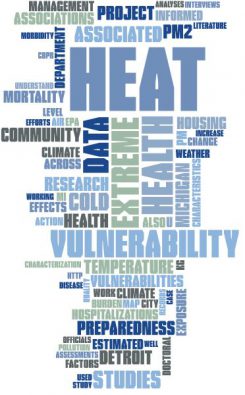Carina Gronlund
Research Assistant Professor, Social Environment and Health Program
As an environmental epidemiologist and with funding from the National Institute of Environmental Health Sciences, the National Science Foundation, and Detroit community input, I study how social, economic, health, and built environment characteristics and/or air quality affect vulnerability to extreme heat and extreme precipitation. This research will help cities understand how to adapt to heat, heat waves, higher pollen levels, and heavy rainfall in a changing climate.
I received my BA in Biology from the University of Chicago, with a specialization in Ecology and Evolution. Subsequently, I worked as a research assistant in the Clinical Trials Office at the Karmanos Cancer Institute in Detroit, MI before pursing a Masters in Public Health at the University of Michigan. I completed my MPH in 2008 and then completed my PhD in 2013 in the University of Michigan Department of Environmental Health Sciences, where I was a National Institute on Aging Public Health and Aging trainee. My dissertation focused on associations between high temperatures and hospital admissions and mortality among the elderly as well as sociodemographic and land cover characteristics that modify these associations. In my postdoctoral fellowships, I studied how social and environmental characteristics influence vulnerability to heat-related health effects, using data from longitudinal studies of cardiovascular health in seven U.S. cities as well as state and national records of severe health events.
Research Projects
Assessing the Neuropsychological Benefits of Weatherization Programs
(R01 ES032157)
Modifications to homes that increase energy efficiency and improve indoor temperatures may reduce the health impacts of extreme temperatures and financial stress. We will characterize and monetize the health impacts of low-cost and higher-cost weatherization measures, which may improve the health of older adults through improvements to sleep, cognitive function, and financial worry as well as community-wide reductions in air pollution exposure. Weatherization interventions may allow older adults to both mitigate and adapt to extreme weather.
Michigan Center on Lifestage Environmental Exposures and Disease (M-LEEaD)
(P30 ES017885)
The M-LEEaD mission is to accelerate research that defines impacts of environmental exposures during vulnerable life stages and to promote translation of findings to improve clinical and public health interventions for the mitigation of disease. Our Center implements its mission through infrastructural support of established and new investigators applying novel transdisciplinary approaches that increase understanding of how exposures target vulnerable stages of life.
SCC-IRG Track 1: Reducing Barriers to Residential Energy Security through an Integrated Case-management, Data-driven, Community-based approach
(NSF1952038)
The goal of this Smart and Connected Communities (SCC) project is to explore the efficacy of new social-technological paradigms to reduce residential energy insecurity for low- and moderate-income (LMI) households in three neighborhoods in Detroit, Michigan, which is one of the top ten highest energy burdened metros in the US.
Publications
- Buxton MA, Heydarzadeh S, Gronlund CJ, et al. Associations between air pollution exposure and blood pressure during pregnancy among PRINCESA Cohort participants. Toxics. 2023;11(5):424. doi:10.3390/toxics11050424
- Stone B Jr, Gronlund CJ, Mallen E, et al. How blackouts during heat waves amplify mortality and morbidity risk. Environ Sci Technol. 2023;57(22):8245-8255. doi:10.1021/acs.est.2c09588
- Larsen LS, Gronlund CJ, Ketenci KC, Harlan SL, Hondula DH, Stone B, Lanza K, Mallen E, Wright MK, O’Neill MS. Safe at home? A comparison of factors influencing indoor residential temperatures during warm weather among 3 cities. J Am Plann Assoc. 2023;89(3):363-375. doi: 10.1080/01944363.2022.2087724
- Gronlund CJ, Ketenci KC, Reames TG, et al. Indoor apparent temperature, cognition, and daytime sleepiness among low-income adults in a temperate climate. Indoor Air. 2022;32(1):e12972. doi:10.1111/ina.12972
- Bergmans RS, Larson P, Bennion E,…Gronlund CJ. Short-term exposures to atmospheric evergreen, deciduous, grass, and ragweed aeroallergens and the risk of suicide in Ohio, 2007-2015: exploring disparities by age, gender, and education level. Environ Res. 2021;200:111450. doi:10.1016/j.envres.2021.111450
- Khan AM, Finlay JM, Clarke P,…Gronlund CJ. Association between temperature exposure and cognition: a cross-sectional analysis of 20,687 aging adults in the United States. BMC Public Health. 2021;21(1):1484. doi:10.1186/s12889-021-11533-x
- Lanza K, Stone B, Chakalian PM, Gronlund CJ, et al. Physical activity in the summer heat: how hot weather moderates the relationship between built environment features and outdoor physical activity of adults. J Phys Act Health. 2020;17(3):261-269. Published 2020 Mar 1. doi:10.1123/jpah.2019-0399
- Larson PS, Gronlund C, Thompson L, et al. Recurrent home flooding in detroit, mi 2012-2020: results of a household survey. Int J Environ Res Public Health. 2021;18(14):7659. doi:10.3390/ijerph18147659
- Stone B Jr, Mallen E, Rajput M, Gronlund CJ, et al. Compound climate and infrastructure events: how electrical grid failure alters heat wave risk. Environ Sci Technol. 2021;55(10):6957-6964. doi:10.1021/acs.est.1c00024
- Cardoza JE, Gronlund CJ, Schott J, Ziegler T, Stone B, O’Neill MS. Heat-related illness is associated with lack of air conditioning and pre-existing health problems in Detroit, Michigan, USA: a community-based participatory co-analysis of survey data. Int J Environ Res Public Health. 2020;17(16):5704. doi:10.3390/ijerph17165704



